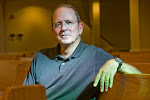Christianity or Christ-ain’t-in-it-anity?
So I know I am not the judge of what
is authentic Christianity but of late I sure wonder about a version that seems
to be circulating in the midst of this heated political divide we now have in
our land. As I listen and read words offered
by those who claim the title “Christian,” I wonder what those words have to do
with the founder of the faith.
Many who wear the sweatshirt that
says Christian seem to be espousing
views that not only fail to reflect the message of Jesus but actually seem to
be contrary to it. Jesus would not be
convinced that just because our economy is doing “great,” we can make it a kind
of idol that helps us forget the “least, the lost, and the forgotten.”
Jesus took his lessons on economic
policy from prophets like Amos. Michael
Barram in his book Missional Economics writes:
Whatever we may want to say about
capitalism or any other economic system, Christians should take Amos’s message
seriously: If the poor are being mistreated, God is angry. Might God actually
be angry with us and, if so, what might we need to do about it? Second, Amos
reminds his audience what it looks like to remain faithful to God in a
covenantal relationship, making it clear that authentic worship and religion
must be paired with just economic behavior. Our economic conduct, and how it
affects the poor and marginalized, is and will always be a matter of Christian
faithfulness, theologically speaking. Have we effectively divorced our orthodox
religious claims from our economic practices? To what extent might God be tired
of our worship, of our religious rituals, given the ways the poor and
marginalized are affected by our economic priorities and choices? Such
questions point to the heart of the gospel, both for Amos and, as we shall see
elsewhere in the Bible, for Jesus as well.
We
have gotten use to the phrase, “It’s the economy, stupid.” May I suggest that
when it comes to the message of Jesus, to view everything through the economy
may not be exactly stupid but leads to a kind of foolishness that waters down
the gospel. What I hear from some who claim to “know” Jesus is a kind of soupy
civil religion. The God of Jesus is the
God of the nations not the God of the
nation.
Words
that demonize those who come seeking a new life in our country should not be on
the same lips that proclaim Jesus as Lord.
In shutting out the stranger we just may be slamming the door on Jesus
who claimed to be seen in the faces of the “least of these.”
And
by the way I am not sure how Jesus would feel about the Second Amendment but I
think I can glean how he might feel about assault weapons. Jesus never spoke about “my rights.” He focused on the common good and talked in
terms of community.
What
I hear lately from some is not Christianity…it is more like Christ-ain’t-in-it-anity. The label on the front may read “Christian,”
but upon listening to the values espoused, Christ is nowhere to be found. What is discovered when the veneer is pulled
back is a form of narrow nationalism that has co-opted Jesus. He will have none of it.
The
ethic of Jesus is based upon risky love.
His kind of love knows no borders or labels. It is a love ethic that reaches out with open
hands and hearts to those who differ from us.
It is kind of love that does not condone much less absorb violence.
I
am not sure Jesus would recognize what he left to us if he showed up to check
out “his” faith. I know I sure fail him
often but at least I know what failure looks like. I have trouble turning the other cheek,
praying for those who despitefully use me, taking the last place instead of the
first, and getting the log out of my eye before I criticize the speck in
someone else’s eye.
But
then maybe on that last one I am guilty of doing just that. I am simply offering a word of caution to
those of us who claim the name of Jesus to check out how close our economics
and politics are to the actual message of Jesus.

